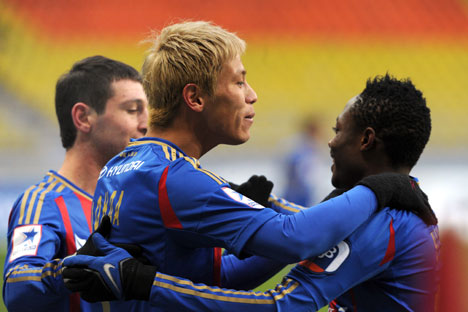
The Japanese midfielder took over from Russia’s most talented played, Alan Dzagoev, who was benched for a string of woeful performances. Source: RIA Novosti
The 2012-2013 soccer season enters its final stretch in Russia after a lengthy winter break — which lasts even longer than the pre-season, due to the harsh climate conditions in this part of the world. The country’s top teams, including CSKA Moscow, Anzhi Makhachkala and Zenit St. Petersburg, will soon resume their race for the title.
There were a number of stand-out matches during the fall portion of the schedule, though it was also marred by several high-profile scandals. Zenit was never far away from the back page. The title favorites have an enviable combination of good team chemistry, experienced players, a European-level coach and strong financial support (from the gas giant Gazprom).
Medvedev wants a lifetime stadium ban for sports fans
Russian forward Pavel Pogrebnyak remains focused on Premier League
Yet it was money that did them in this time. In late summer, the St. Petersburg side purchased two star players — Brazilian forward Hulk from FC Porto and Belgian midfielder Axel Witsel from Benfica. The combined transfer fee of $95 million was a record for the Russian league.
Consequently, Russian players were disgruntled with the newcomers’ astronomic pay checks. Zenit captain and national team player Igor Denisov protested against what he believed was as an unjust distribution of funds within the club by refusing to play against PFC Krylia Sovetov. Coach Luciano Spalletti responded by demoting him to the reserve team. In spite of Denisov’s subsequent apology and return to the first team, the incident definitely took a toll on the relationships within Zenit.
Internal bickering prevented the team from playing its best soccer and led to weak performances in both the Russian championship and the UEFA Champions League. Zenit finished the first half of the Russian Premier League season in third place, and they fell into the Europa League after failing to qualify for the Round of 16 in the Champions League — a far cry from the results the club managers had expected.
This spring, Zenit will have to start proving that it still aspires to become one of Europe’s premier soccer teams. The domestic title is well within reach.
The problems faced by Zenit have benefited Anzhi Makhachkala, which is becoming increasingly more well-known in Europe. The team, led by former Russian national team coach Guus Hiddink, looked very convincing in the fall. Anzhi experienced practically no dips in form and was able to avoid losses to underdogs. As a result, the team currently sits second in the table and has a real shot at the title.
Anzhi’s two-legged victory against Hannover in the last Europa League’s 16 proved the strength of the side, which is based in the village of Kratovo in the Moscow suburbs. Despite the departure of powerful center-back Christopher Samba, Hiddink has enough quality players on his squad: the club signed Shakhtar Donetsk’s attacking midfielder Willian to complement star players Samuel Eto’o and Lassana Diarra. The Brazilian cost Anzhi €35 million ($45.5 million) and is expected to strengthen the team’s already dangerous attack.
CSKA Moscow was the surprise leader after the fall stretch, as Russian coach Leonid Slutsky was able to push his team to the limit, despite a string of injuries. The “Army Men” lost almost all of their forwards early in the season, so Slutsky was forced to play Nigerian midfielder Ahmed Musa as a striker. The half-back felt at ease with his new role, scoring 8 goals in 19 games.
Still, it was Keisuke Honda’s brilliant play that propelled the team forward throughout the first part of the season. The Japanese midfielder took over from Russia’s most talented played, Alan Dzagoev, who was benched for a string of woeful performances. Honda did everything: he scored, provided assists, created numerous chances and was generally indispensable all over the field. The defenders, alongside goalkeeper Igor Akinfeev, were also on top of their game, allowing less than one goal per game all fall.
During the winter break, CSKA management was busy trying to find a solution to the team’s most pressing issue — the lack of forwards. As a result, they were able to reach a deal with Brazilian side Flamengo on the transfer of CSKA striker and fan-favorite Vagner Love, whose outstanding performance helped the team win the 2005 UEFA Cup. Vagner’s return rekindled CSKA’s championship title hopes, but it will hardly be smooth sailing, with Anzhi trailing by only two points.
Spartak Moscow was the biggest loser during the first half of the season. The country’s most popular team failed to play balanced soccer. The summer hire Unai Emery was dismissed after a string of losses in Russia and the Champions League, falling short of the expectations of both his employers and the fans. The vacated post was occupied by last season’s coach, Valery Karpin.
Spartak signed Italian defender Salvatore Boccetti from Rubin and Croatian defensive midfielder Ognen Vukojević from FC Dynamo Kiev during the winter break. The new signings are expected to cement the defense, which had been a disaster throughout the whole autumn — 30 goals conceded in 19 games are too much for a team with serious ambitions.
Lokomotiv Moscow and Rubin Kazan are two more title contenders. Lokomotiv hired promising Croatian coach Slaven Bilić during the pre-season, while Rubin made perhaps the loudest transfer statement among all Russian clubs during the transfer window by signing Rennes midfielder Yann M’Vila. The talented 23-year-old Frenchman a player for the future, although he can help his team out right away — 11 points is not an insurmountable gap.
All rights reserved by Rossiyskaya Gazeta.
Subscribe
to our newsletter!
Get the week's best stories straight to your inbox